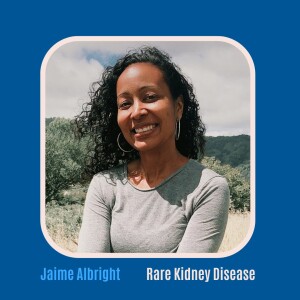
Monday Apr 07, 2025
#57 APOL1-Mediated FSGS: What Families Need to Know, from Diagnosis to Advocacy
Jaime Albright Henighan shares her family’s journey after two of her sons, Joshua and Jorden, were diagnosed with a rare genetic kidney disease called APOL1-mediated FSGS (Focal Segmental Glomerulosclerosis).
Jaime’s story highlights the importance of early detection, education, and advocacy for families navigating this challenging condition. She discusses her partnership with Nephcure, a patient advocacy organization, and her mission to raise awareness about FSGS, especially among individuals of West African descent, who are at higher risk due to the APOL1 gene mutation.
Topics Covered:
- What is FSGS?: Understanding APOL1-mediated FSGS and its impact on kidney health.
- The Family’s Journey: How high blood pressure led to Joshua’s diagnosis, and the shock of discovering Jorden had the same condition.
- The Role of Genetics: Why individuals of West African descent are at greater risk and the importance of genetic awareness.
- Early Detection: How identifying symptoms early has helped Jaime’s sons manage their health.
- Advocacy and Education: Jaime’s work with Nephcure and her efforts to raise awareness globally, including in Ghana.
- Parenting Through Challenges: Jaime’s emotional journey as a mother and her advice for other parents navigating rare diseases.
Key Moments:
- Jaime explains how her family discovered FSGS and the challenges they faced in obtaining a diagnosis.
- Insights into the genetic factors behind APOL1-mediated FSGS and its prevalence in specific populations.
- Advocacy efforts to educate families and healthcare providers about the disease.
Guest Bio:
Jaime is a wife and mother of six. Her family resides in Alpharetta, GA. She is also a Forensic Interviewer and Podcast Producer at Tenderfoot TV. In 2021, her seemingly healthy 17 year old son, Joshua, was randomly diagnosed with high blood pressure. This led to additional testing and a diagnosis of Focal Segmental Glomerulosclerosis (FSGS), a rare genetic kidney disease. Later that year, her 25 year old son, Jorden, was also diagnosed with FSGS. This was shocking to the Albright Henighan family. How could they be at high risk of a disease that they had never heard of? They connected with Nephcure, a patient advocacy organization, for support and resources. They learned that 1 in 8 people of West African descent are at risk of APOL1 mediated FSGS due to a genetic mutation. Thanks to early detection, her sons are stable today but this is a rare outcome for FSGS patients due to a lack of education and barriers in the medical community. They decided to share their story across the United States and even in Ghana. Their goal is to educate and empower others. If caught early, there are medical interventions and clinical research trials that can save native kidneys and lives. There is hope for FSGS patients.
Resources Mentioned:
- Nephcure Kidney International: Advocacy and support for families affected by kidney diseases.
- Information on APOL1-mediated FSGS and genetic testing.
- Tips for recognizing early symptoms of kidney disease.
Connect with Us:
Stay tuned for the next new episode of “It Happened To Me”! In the meantime, you can listen to our previous episodes on Apple Podcasts, Spotify, streaming on the website, or any other podcast player by searching, “It Happened To Me”.
“It Happened To Me” is created and hosted by Cathy Gildenhorn and Beth Glassman. DNA Today’s Kira Dineen is our executive producer and marketing lead. Amanda Andreoli is our associate producer. Ashlyn Enokian is our graphic designer.
See what else we are up to on Twitter, Instagram, Facebook, YouTube and our website, ItHappenedToMePod.com. Questions/inquiries can be sent to ItHappenedToMePod@gmail.com.
No comments yet. Be the first to say something!